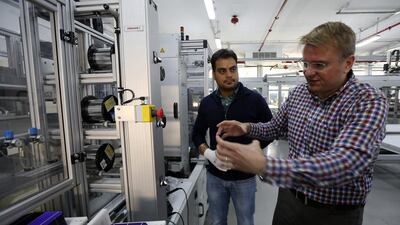FUJAIRAH // Staff at the Solon solar module plant in Fujairah are convinced their work could be the key to a bright future for solar power in the country.
The plant’s products are aimed at homes and businesses that want to install rooftop panels to take advantage of the abundant solar resources.
Situated in the Fujairah Free Zone, the plant is a year old and is the only manufacturer of high-quality solar modules in the country.
Early next year, the plant plans to double its production of solar panels with a joint capacity that can produce 150 megawatts (MW) of energy a year.
At present, the modules are sold abroad, mostly in Germany and Italy, but when the plant’s two new production lines open management has hopes the additional panels would be used in local projects.
“This could be the engine of change for the UAE,” said Sascha Gaede, the director of global sales at Solon, as he pointed across the large hall where the new equipment has been installed and was being tested.
The company is already fielding inquiries from UAE-based establishments looking to fit solar rooftop installations.
“We can start in the beginning of the year,” Mr Gaede said. “It is a question of demand.”
Each solar panel consists of 60 solar cells – devices that convert sunlight into energy. The company has a facility to produce solar cells but about 80 per cent of the cells it uses are imported.
At only 200 microns (0.2 millimetres) thick, the cells are as fragile as potato crisps and it takes just the gentlest of pressure to break them. Layers of special plastic foil and glass cover the cells to protect them.
Mr Gaede said the production process was like making a sandwich. “You have various layers put together, which you then bake into an oven,” he said.
The reality, however, is far more complicated.
The process starts at a laboratory, where the materials needed to produce solar panels are first tested against quality parameters.
The layers of the solar module are arranged starting with the glass, which is brushed, washed and dried before a layer of foil and a label with a unique bar code are put on top.
The bar code allows the manufacturer to later track down information, such as when and where a solar module has been produced, as well as how it performed in tests done right after it was finished.
In the net phase of production, robotic arms arrange individual solar cells into rows or, as the operators said, strings of 10.
The strings are placed on top of each piece of glass so that, typically it takes six rows of strings to create a module, measuring one metre by 1.64 metres.
Each solar module is baked in a furnace at 140°C to ensure all the different layers stick together into a coherent whole. An aluminium frame is then attached to complete each module.
Solon, which has experience in building large-scale solar plants, arrived in the country last year through a merger in which a UAE-based manufacturer, Microsol, acquired its assets.
The German company had been struggling financially and filed for insolvency in 2011. The deal allowed Microsol to increase its production capacity and achieve what Mr Gaede referred to as “German quality with the low labour costs of the UAE”.
vtodorova@thenational.ae

